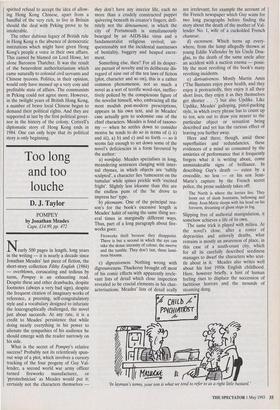Too long and too louche
D. J. Taylor
POMPEY by Jonathan Meades Cape, £14.99, pp. 472 Nearly 500 pages in length, long years in the writing — it is nearly a decade since Jonathan Meades' last piece of fiction, the short-story collection Filthy English (1984) — overblown, coruscating and tedious by turns, Pompey is an exhausting read. Despite these and other drawbacks, despite footnotes (always a very bad sign), despite the frequent citation of imaginary works of reference, a preening, self-congratulatory style and a vocabulary designed to infuriate the lexicographically challenged, the novel just about succeeds. At any rate, it is a credit to Meades' persistence that while doing nearly everything in his power to alienate the sympathies of his audience he should emerge with the reader narrowly on his side.
What is the secret of Pompey's relative success? Probably not its relentlessly spun- out wisp of a plot, which involves a cursory tracking of the four progeny of Guy Val- lender, a second world war army officer turned fireworks manufacturer, or `pyrotechnician' as Meades would put it; certainly not the characters themselves — they don't have any interior life, each no more than a crudely constructed puppet quivering beneath its creator's fingers; defi- nitely not the denouement, in which the city of Portsmouth is simultaneously beseiged by an AIDS-like virus and a fundamentalist religious revival; un- questionably not the incidental nastinesses of bestiality, buggery and heaped excre- ment.
Something else, then? For all its desper- ate pursuit of novelty and its deliberate dis- regard of nine out of the ten laws of fiction (plot, character and so on), this is a rather common phenomenon, not so much a novel as a sort of terrific word-riot, ineffec- tively policed by the conspicuous figure of the novelist himself, who, embracing all the most modish post-modern prescriptions, appears in his own text, and in Meades' case actually gets to sodomise one of the chief characters. Meades is fond of taxono- my — when he settles down to consider motive he tends to do so in terms of i) ii) and iii), a) b) and c) and so forth — so it seems fair enough to set down some of the novel's deficiencies in a form favoured by the author:
a) wordplay. Meades specialises in long, meandering sentences clanging with inter- nal rhymes, in which objects are `tuftily sculpted', a character lies 'tumescent on the tumulus' while spines prickle with 'excited fright'. Slightly less irksome than this are the endless puns of the 'he drove to impress her' type.
b) pleonasm. One of the principal rea- son's for the book's excessive length is Meades' habit of saying the same thing sev- eral times in marginally different ways. Thus, part of a long paragraph about fire- works goes:
Fireworks thrill because they disappoint. There is but a second in which the eye can take the dense intensity of colour, the swerve and the tumble. They don't last, these lumi- nous blooms.
C) digressiveness. Nothing wrong with digressiveness. Thackeray brought off most of his comic effects with apparently irrele- vant lists of detail which close inspection revealed to be crucial elements in his char- acterisations. Meades' lists of detail really
are irrelevant; for example the account of the French newspaper which Guy scans for two long paragraphs before finding the story about the death of the mother of Val- lender No. 1, wife of a cuckolded French chanteur.
d) excrement. Which turns up every- where, from the lump allegedly thrown at young Eddie Vallender by his Uncle Dou- glas, to the death of the same uncle after an accident with a suction enema — possi- bly the most revolting of the book's many revolting incidents. e) derivativeness. Mostly Martin Amis (`The Bantutes enjoy poor health, and they enjoy it protractedly, they enjoy it all their short lives, they enjoy it as they themselves get shorter . . .') but also Updike. Like Updike, Meades' galloping, pistol-packing style, in which every phrase has to count up to ten, sets out to draw you nearer to the particular object or sensation being described and yet has the curious effect of leaving you further away.
Here and there, though, amid these superfluities and redundancies, these evidences of a mind so consumed by the anxieties of performance that it frequently forgets what it is writing about, come unmistakeable signs of brilliance. In describing Guy's death — eaten by a crocodile, no less — or his son Jean- Marie's capture by the French secret police, the prose suddenly takes off:
The North is where the lorries live. They loom out of slush fountains, bellowing and shiny. Jean-Marie sleeps with his head on his forearm, dreaming of ghost ships in fog.
Slipping free of authorial manipulation, it somehow achieves a life of its own.
The same trick is played with milieu. At the novel's close, after a roster of depravities and unlovely deaths, what remains is mostly an awareness of place, in this case of a south-coast city, which for all its carefully described seediness manages to dwarf the characters who scut- tle about in it. Meades also writes well about his lost 1950s English childhood. Here, however briefly, a hint of human feeling rises to displace the succession of factitious horrors and the mounds of steaming dung.
`In layman's terms, your son is what we tend to refer to as a right little bastard.'


























































 Previous page
Previous page